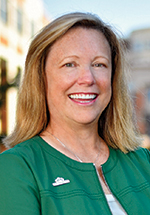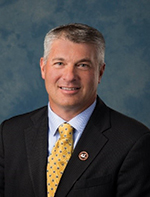The biggest news among the Charlotte region’s higher education institutions may be a campus that isn’t quite there yet.
“Charlotte was the largest U.S. city without a four-year medical school” says Tom Osha, the executive vice president at Wexford Science + Technology, the development partner behind Charlotte’s innovation district known as The Pearl. “The move by Wake Forest University to open a second School of Medicine — the first is in Winston-Salem — in Charlotte in partnership with Atrium Health is the catalyst around which the Pearl is forming. With Innovation Quarter [in Winston-Salem] on one end and The Pearl just over an hour away, you will have two innovation districts that share an academic and research engine (Wake Forest); a clinical enterprise (Atrium Health); a development partner focused only on innovation districts (Wexford Science + Technology); and common programming that will tie the two ends together. This is unique in the United States.”

"UNC Charlotte is unique among major national universities in that more than half of its 150,000 alumni choose to live and work in the region.”
— Dr. Sharon L. Gaber, Chancellor, University of North Carolina at Charlotte
One could say the talent and skills bred at the area’s schools are the pearls around which business clusters form.
This spring I asked the area’s higher education institution leaders one question: How do your institution’s programs, people and culture help the Charlotte region distinguish itself in economic and workforce development?
“Catawba Valley Community College, as a proud member of the Charlotte Region, is committed to the future economic vitality and talent development pipeline in a unique location to live, work, and play,” Dr. Garrett D. Hinshaw, president, Catawba Valley Community College, wrote back. “As the workforce continuously evolves, we are focused on creating innovative programming that is driven by the businesses that call this region home and by those that will be here tomorrow. The Charlotte Region and its citizens benefit when all of our community colleges work together as partners through collaboration and intentional future-focused initiatives that take care of our existing economies and demonstrate that we have a track record of building the workforce capacity necessary for future growth.”
Campus Crib Notes
 Johnson C. Smith University, an HBCU, is well known for its Road to Hire program with Red Ventures and its Project Destined program with the Urban Land Institute. It’s also slated to receive $85 million via Mayor Vi Lyles’ Racial Equity Initiative.
Johnson C. Smith University, an HBCU, is well known for its Road to Hire program with Red Ventures and its Project Destined program with the Urban Land Institute. It’s also slated to receive $85 million via Mayor Vi Lyles’ Racial Equity Initiative.
Catawba Valley Community College, led by President Dr. Garrett D. Hinshaw (pictured) is in the top 10 nationally for best online associate degree in entrepreneurship. Its Workforce Solutions Complex has won 10 national championships in the Skills USA National Competition. CVCC Furniture Academy’s expansion to a 38,000-sq.-ft. facility has helped put more graduates to work within the furniture industry.
York Technical College, the top construction school in South Carolina, in November 2021 announced it will offer more than 100 academic programs to students at no cost beginning in spring 2022 as part of South Carolina Gov. Henry McMaster’s Workforce Scholarship for the Future program that’s being funded at the state’s 16 technical colleges with $17 million in COVID relief funds.
Rowan-Cabarrus Community College annually serves more than 20,000 individuals on its seven campuses and sites across the two counties.
UNC Charlotte has a $2.1 billion economic impact on the Charlotte region. There are over 35 companies and startups collocated on the campus, where 38% of undergrads are pursuing STEM majors.
University of North Carolina at Charlotte Chancellor Dr. Sharon L. Gaber, whose professional background is in regional planning, wrote, “UNC Charlotte is a driving force for economic growth, and as the Charlotte region’s largest public research university, it is working with leaders in the public and private sector to deliver academic programming and innovative research to meet the current and future workforce needs of the dynamic, emerging world-class city of Charlotte. Charlotte’s student enrollment is nearly 30,500, which includes a record number of master’s and doctoral students, attracted by computer science, engineering, education, public health, social work and the Carolinas’ only School of Data Science. Charlotte’s emphasis on academic offerings that strengthen the region’s talent pipeline is indicative of the reciprocal relationship a leading research university must have with the city and region it serves.”

